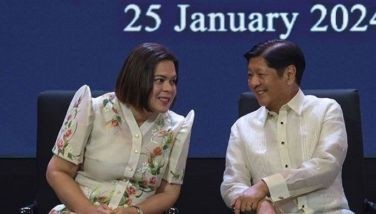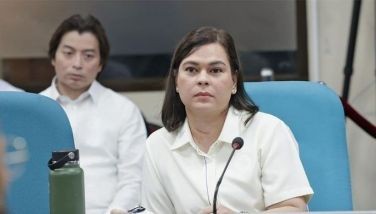Sub judice
In the column Postscript by Mr. Federico D. Pascual Jr. that came out in your Sunday (Nov. 16, 2014) issue of the Philippine STAR under the heading On pardon of Erap, ask GMA her intent, he belabors the issues that the Supreme Court should resolve, namely: a) the interpretation of the absolute pardon that then PGMA gave Estrada after his conviction for plunder in 2007; b) that the High Court hold in abeyance its decision and summon PGMA to explain the real extent and intent of her act of clemency; c) Estrada’s statement in the executive clemency not to seek public office cannot restrict or prevail over the statement in the pardon which restored all of Estrada’s civil and political rights; and d) being allowed to run, in 2010 and 2013, with millions of supporters voting for him is a sovereign expression of vox populi.
It is intervenor Lim’s stance that Mr. Pascual’s opinon violates the rule barring anyone from speaking out his opinion on cases in Court for being sub judice especially when the views tend to favor a party.
If Mr. Pascual says that the Supreme Court is about to hand down its long-awaited decision on the petition seeking to remove former President Erap Estrada as elected Mayor of Manila, all the more he should have refrained from airing his own views as it serves no worthy purpose except to belittle the position of Intervenor Lim or to influence the High Court in deciding the case in accordance with his views.
While I am are tempted to answer Mr. Pascual’s dissertation, I realize that I have to — and rightly so — faithfully abide by the sub judice rule and hold my reins on disparaging and demonstrating the weakness of Erap’s argument or perorate on the strength of Intervenor Lim’s thesis supporting Erap’s ouster.
Indeed, Intervenor Lim’s silence in refuting the assertions of Mr. Pascual does not indicate bankruptcy of Intervenor Lim‘s position nor of the indomitable correctness of Erap’s thesis, but rather of Intervenor Lim’s adherence to the rule on sub judice, a stance that many ignore and wantonly violate.
It is apt to mention that since all the issues in the disqualification case before the High Court had been presented to it for resolution after the parties had filed their respective memoranda, which incidentally already incorporate what Mr. Pascual suggests, there appears to be no legal mooring for anyone, whether a party or not, to come out with his own dissertation and ventilate his views in the media.
For Mr. Pascual’s guidance, the Supplemental Opinion of the Hon. Justice Arturo D. Brion in the much publicized and celebrated Webb Case, Lejano v. People 638 SCRA 104 (2010), on the rule on sub judice is enlightening which can educate him, thus:
In essence, the sub judice rule restricts comments and disclosures pertaining to pending judicial proceedings. The restriction applies not only to participants in the pending case,i. e., to members of the bar and bench, and to litigants and witnesses, but also to the public in general, which necessarily includes the media. Although the Rules of Court does not contain a specific provision imposing the sub judice rule, it supports the observance of the restriction by punishing its violation as indirect contempt under Section 3(d) of Rule 71 x x x . (at page 192)
Truly, Justice Brion said that justification for the rule is to shield the Court from embarrassment or influence in its all-important duty of deciding the case.
In sum, the court, in a pending litigation, must be shielded from embarrassment or influence in its all-important duty of deciding the case. Any publication pending a suit, reflecting upon the court, the parties, the officers of the court, the counsel, etc. with reference to the suit, or tending to influence the decision of the controversy, is contempt of court and is punishable. The resulting (but temporary) curtailment of speech because of the sub judice rule is necessary and justified by the more compelling interests to uphold the rights of the accused and promote the fair and orderly administration of justice. (at page 199)
It is strongly urged, therefore, that Mr. Pascual refrain from using the pen to denigrade intervenor Lim‘s cause as he has been wont to do so in the past.
Thank you for giVing me the opportunity to legally respond to the opinion of Mr. Pascual on the disqualification of Mayor Estrada and for givingthis letter a space in your morning daily. — Renato G. de la Cruz, Counsel for Intervenor Alfredo S. Lim
- Latest




















